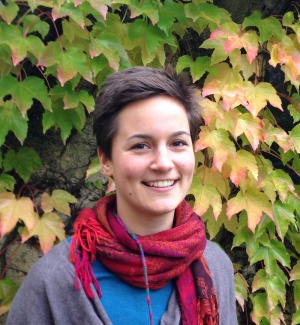Herzlich Willkommen zum Mitglieder-Wiki von Wikimedia Österreich.
Für ein Benutzerkonto schreibe bitte an verein [at] wikimedia.at
Projekte/Workcamp Wikipedia for Peace/Jana Forsthuber
Interview
Jana Forsthuber

Chairlady of Service Civil International (SCI) Austria
Service Civil International (SCI) is one of the oldest peace and voluntary organizations (NGO/NPO) in the world, with more than 90 years of experience in the coordination of volunteering projects and exchange programmes. Since 2015, Wikimedia Österreich has been collaborating with the local SCI branch in order to make use of free knowledge as an instrument for more tolerance and social participation by the vehicle of joint projects. In our interview, peace activist Jana Forsthuber of SCI talks about why this is relevant and important today and for the future.
Why is it important to be involved in peace-related issues even in a peaceful society and what, from your point of view, are the main challenges to this effect in Austria and Europe today?
- It's hard for me to say at what point a society is considered truly "peaceful". After all, we also influence many other societies with our lifestyle and our politics, and it is not always clear whether these contribute to more peace. At the moment, I see mainly the strong tendency to distance oneself from others as a "society" as a problem. The minute a discussion turns to subjects like religion and values, the question quickly arises of what separates people from each other, even though it would be much more important to promote the uniting aspects. I believe it is currently incredibly important to question global relationships both in Austria and in Europe, and yet to understand, in the immediate environment, that individuals cannot only be defined by the society they are presumed to have grown up in. On top of this, commitment to peace-related issues as I see it represents everyone's interests, while it is much more common to represent only one's own interests.
What contribution can free knowledge make to a more peaceful society?
- I believe that education and knowledge are a good, if not the best basis for a peaceful society. Of course there is never a guarantee for what knowledge is "true knowledge", but we should always aspire to comprehend the complexity as much as possible. Free knowledge means, above all, to ensure access to it for all and to take a step toward equal opportunities, enlightenment, democracy and global understanding.
What makes Wikimedia Österreich a great ally in your work?
- The idea for this cooperation came from my colleague, Thomas Schallhart, who is involved in countless projects and thematic areas in his free time. With Wikimedia we found an ally in this diversity whose aim is also, in a way, not only to think big, but to act as well. We have an enormous network in the SCI too, but in Austria we are just a group of likeable people who work together and are very open for new members from all fields of interest and age groups. Just like the people I met who are behind Wikimedia Österreich.
What has been your personal highlight in cooperation so far?
- In the summer, I was a camp coordinator at the work camp "Wikipedia for Peace" for two weeks. For this purpose, 12 European volunteers got together in Vienna to get to know Wikipedia better and to become involved in peace-related issues. You can find out more about this project and its results on Wikimedia and Wikipedia, which I can finally, by rights, quote as a source (https://de.wikipedia.org/wiki/Wikipedia:Workcamp_Wikipedia_for_Peace). I participated in the various workshops there and, for instance, co-organised a tour through Vienna during which Wikimedia commons images of monuments were taken. Personally, I learned many new things during these two weeks and, above all, did a lot of research on the subject of asylum.
Many readers of Wikipedia are unaware that there is a community of authors, photographers and coders or Wikimedia associations behind this website who support them in their work. How would you describe the community and cooperation with this community to these people in a nutshell?
- It's definitely worth getting to know the people who are behind this well-known and commonly used website personally. On the whole, cooperation was very straightforward and flexible, which also became apparent in the evenings spent cooking together and the cosy get-togethers. The low-threshold access to Wikimedia surprised me too, and this experience helps me appreciate Wikipedia even more and inspires me to contribute to it in the future.